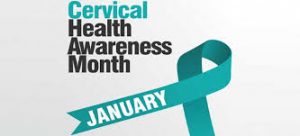
People across the U.S. are kicking off 2018 right with health-conscious resolutions. According to Statista, 45% of Americans hope to “lose weight or get in shape” in 2018. But January offers another opportunity to celebrate and jump-start health awareness: it’s Cervical Health Awareness Month.
In the U.S. there are between 11,000 and 13,000 new cases of cervical cancer annually, and cervical cancer is the fourth most prevalent form of cancer among women globally. While patients diagnosed with early-stage cervical cancer have 5-year survival rates of up to 91%, the disease becomes far more deadly as cancerous cells spread to other parts of the body.
Fortunately, proactive methods like HPV vaccinations and screenings can keep cervical cancer at bay, and mitigate almost all deaths related to cervical cancer. However, access to such healthcare often depends on a woman’s geographic location and socioeconomic status. According to the WHO, “approximately 90% [of] the 270,000 deaths from cervical cancer in 2015 occurred in low- and middle-income countries.”
Duke Global Health Institute researchers are at the forefront of eliminating cervical cancer-related healthcare gaps through projects around the globe. In honor of Cervical Health Awareness Month, we’re profiling three of these faculty members, Dr. Megan Huchko, Dr. Gita Suneja and Dr. John Schmitt.
Huchko, associate professor of Obstetrics & Gynecology and Global Health, is the director of Global Reproductive Health at Duke.
“My work has focused on global women’s health, health disparities and developing models of care that increase women’s access to services that will address some of these disparities,” Huchko says. “I have been working in Western Kenya for the past ten years to enhance reproductive health services in HIV-care setting, and provide community-based family planning and cervical cancer screening.”
Since 2006, Huchko has collaborated with the Kenya-based Family AIDS Care and Education Services (FACES), through which she launched a cervical cancer screening and prevention (CCSP) initiative. Her ongoing projects include studies in both Uganda and Kenya evaluating community-based cervical cancer prevention campaigns, and self-administered screening strategies.
 Huchko joined DGHI’s global cancer initiative in fall 2016, along with Suneja, an associate professor of Radiation Oncology and associate research professor of Global Health. Suneja’s interest in cervical cancer is evident in the titles of research papers she has co-authored, including “HIV Infection and Survival Among Women With Cervical Cancer” and “The cervix cancer research network: increasing access to cancer clinical trials in low and middle-income countries.” While at the University of Pennsylvania, where she completed her internship and residency, she also investigated HIV and cancer co-morbidity in Botswana.
Huchko joined DGHI’s global cancer initiative in fall 2016, along with Suneja, an associate professor of Radiation Oncology and associate research professor of Global Health. Suneja’s interest in cervical cancer is evident in the titles of research papers she has co-authored, including “HIV Infection and Survival Among Women With Cervical Cancer” and “The cervix cancer research network: increasing access to cancer clinical trials in low and middle-income countries.” While at the University of Pennsylvania, where she completed her internship and residency, she also investigated HIV and cancer co-morbidity in Botswana.
 A professor of Obstetrics & Gynecology and Global Health, Schmitt describes his clinical interest as “the screening for and treating premalignant diseases of the uterine cervix, the vulva, and the vagina.” As the director for The Cervical Cancer Prevention Clinic at Duke and a faculty researcher on the team designing a “POCkeT Colposcope” to detect cervical malignancies, Schmitt has investigated this facet of reproductive health across geographic, cultural and economic barriers. For approximately three months of the year, he acts as a teaching consultant at Tanzania’s Kilimanjaro Christian Medical Center, though he also has research sites in Kenya and Peru.
A professor of Obstetrics & Gynecology and Global Health, Schmitt describes his clinical interest as “the screening for and treating premalignant diseases of the uterine cervix, the vulva, and the vagina.” As the director for The Cervical Cancer Prevention Clinic at Duke and a faculty researcher on the team designing a “POCkeT Colposcope” to detect cervical malignancies, Schmitt has investigated this facet of reproductive health across geographic, cultural and economic barriers. For approximately three months of the year, he acts as a teaching consultant at Tanzania’s Kilimanjaro Christian Medical Center, though he also has research sites in Kenya and Peru.
As DGHI faculty members like Huchko, Suneja and Schmitt continue investigating cervical cancer in Durham and around the globe, we’re hopeful 2018 will bring increased health equity and diminished morbidity and mortality. Want to honor #CervicalHealthMonth and kickstart a resolution to take charge of your reproductive health? Find additional cervical health facts, information about free Pap tests and more here.
